- Home
- William Joyce
Guardians Chapter Book #5 Page 4
Guardians Chapter Book #5 Read online
Page 4
It took a moment before the Nightmare Men showed themselves.
In less than an instant Jack once again turned invisible.
report 66g37* London
And as Katherine recalled, by dawn Jack had left London and made his way to the North Pole. He had returned to them, but in all the years since he had never offered any explanation for his long absence or why he was now called Jack Frost.
Katherine knew that Jack was hiding some dark truth. And he was hiding it for a reason. She hoped that now, perhaps, she would finally learn the secrets of her fair-haired boy.
CHAPTER TEN
What’s Good for the Goose Is Grand for the Ganderly
KAILASH LIFTED ONE WING ever so slightly and banked left, gliding silently toward Katherine’s island, to the topmost spire of the main house. It is difficult to ascribe a structure as unique as Ganderly’s as any particular sort of building. It was larger than a house, but not really a mansion. It had several towers, but it wasn’t a castle. It was beautiful, in some ways rather grand, but it was by no means a palace.
It was rambling yet intimate. It was handsome and sturdy, but also airy and graceful. It was certainly elaborate, but in a simple, uncluttered way. There were porches and balconies and decks and walkways and roofs; some were peaked and pitched and pointed. Others were rounded or flat.
A small section of Ganderly
But Ganderly’s most notable feature was the half dozen or so massive trees that twined and curved their way around and throughout the house itself. These were saplings of Big Root, and they had the same gnarled sycamore bark of their mother tree, as well as flowing clusters of thick, elegant limbs that curled outside the windows and balconies. These limbs served as willowy paths and stairways upon which one could walk up to other windows or floors or simply sit amid the treetops that arched over the house like giant leafy umbrellas.
This unusual feature gave Ganderly the appearance of being a sort of tree house estate, which had been Katherine’s plan from the beginning. As a child her favorite secret place had been the makeshift tree house she had made as a nest for Kailash in the topmost branches of Big Root. It was in that tree house that she began to write her many stories, where she first discovered that they had the power to help her make sense of the wonders and sorrows of the real world.
Ganderly had become her grown-up version of that hideaway, the place where, as Mother Goose, she lived and thought and dreamed and wrote. But tonight she would not write. Tonight Jack needed a story. A story to help him make sense of whatever it was that Ombric had told him. And hopefully, save them all.
But first he would need to wake up.
CHAPTER ELEVEN
How to Get the Goose
KAILASH SETTLED INTO HER gargantuan nest nooked in the balcony outside Katherine’s quarters. Jack stirred.
“Did you dream?” Katherine asked him.
“Yes,” he said, shaking off his sleepiness. “I had a dream of you.” He said this in a way that flooded her with memories. He sounded as though he were trying not to be sad.
Katherine turned and smoothed Kailash’s feathers, as was her custom after a journey. Jack scratched behind Kailash’s ear with the tip of his staff. One of Twiner’s many powers was the soothing effect his scratch had on all great beasts: It brought indescribable peace to whoever’s ear was being scratched. For the tribe of North Pole Yetis, the ear scratch was a very effective method of persuasion, especially among the full-blown giants called the Titans. These Titan Yeti roamed the outer perimeters of the North Pole, ever watchful for intruders or explorers. If anyone with evil intent neared the secret city of the north, the Titans would do what needed doing to protect it. With doers of evil, the Titans were generally merciless, but with explorers, they were more considerate. With the North Wind’s help, they would fan up a blinding snowstorm to block any view of the North Pole. Sometimes the Titans would break off vast hunks of iceberg that caused explorers to float out into the Arctic Sea. When that “game” grew tedious for the Titans, they fooled the next groups of explorers by creating a sort of phantom North Pole far from the sight of the actual city of wonders. This had been Jack’s idea. He knew that explorers were searching for something that was scientific, factual, magnetic. Something that was at the geographical top of the world.
The power of the essential ear scratch
“Toys, magic, and Santa Claus are the last things on these learned gents’ minds,” Jack had informed the other concerned Guardians. “So I’ll give them exactly what they’re looking for, and then some.” He’d then directed the Yetis to bury a number of large meteorites (which are extremely magnetic) to establish a “pretend” magnetic pole (all compasses point to this pole) and had the Yetis shift the ancient ice pack under North’s city so that it was never anywhere near the magnetic or geographical top of the world.
Jack, however, couldn’t resist yet another mischievous streak. He allowed several explorers, including the famous Admiral Robert Peary, a glimpse of the great city. He was certain that the adult world would never believe any discovery so fantastic. And indeed he was correct. Peary and his team were laughed at by scientists for claiming to have seen a great, glittering land always out of reach. Their sighting was dismissed as a mere mirage.
Jack understood the limits of the adult imagination as well as he understood the open minds of children and the secret weaknesses of Yetis. While the Titan Yetis were unquestionably heroic and strong, they could sometimes be difficult to corral into action. Lifting meteors and moving cities involved a bit of enticement. So Jack would scratch behind their bed-size ears with the crook of Twiner, and the Yeti Titans would do anything Jack asked.
And so it was also with Kailash. The great goose leaned into the gentle scuffing of the staff’s tip at that perfect spot between head and nape. Himalayan Snow Geese are notoriously aloof to those outside of their daily experience, but Kailash had always been partial to a good ear scratch and gave a sort of slow, goosey, gurgling, giggling sigh.
Glancing toward a window, Jack made sure that Katherine was inside the house before he leaned close and whispered, “Is Katherine happy?”
Kailash stopped her funny sigh and fluttered her eyes open. That was all Jack needed. He spoke fluent goose. The bird gurgled on.
Katherine is not unhappy. But neither is she happy, he gleaned from the goose. But she is very “bright” to see Jack.
“Bright” was a very goosian choice of words. Geese think in simple terms, and bright was always a good thing. Bright was like sunlight or something shiny. To geese, it meant “pleased” or “lucky” or “tickled,” all words that Jack liked to hear. In his long absences he missed Katherine and worried about her, though he hated to admit it.
He sometimes wished for the simpler time when he had been Nightlight. When he was a Nightlight, his feelings were pure, uncluttered, like those of a child. But that was more than a century ago, and there was no way to go back. He was Jack Frost now and would be forever.
And what he needed this night was an answer to what Ombric had put to him. He didn’t understand what had been asked of him, and he was hoping Katherine could help.
CHAPTER TWELVE
The Greatest Library the World Has Never Known
THE NUMBER OF BOOKS IN Ganderly was beyond impressive. Within its many rooms, thousands of shelves pressed snugly upon one another with an ever-growing mass of volumes. Katherine’s Rhymes and Tales, the works we call Mother Goose stories, were but a tiny fraction of her collection. As dowager empress of stories, her library contained virtually every book devoted to children that had ever been. They spread throughout Ganderly in alphabetical order, and far beyond Ganderly as well: Katherine functioned under many guises and disguises to establish libraries and sections of libraries that were devoted to children’s books all over the world.
She was aided in this endless endeavor by the citizens of a tiny nation-state not far from Istanbul (formerly Constantinople) located on the Bosporus Strait. Th
e name of this land was Raconteuristan, and its people were called Raconturks. For millennia, the rulers of Raconteuristan had been chosen not by birth or by lineage or by who was most cunning or adept at war, but by the beauty, wit, and power of the stories they told. Theirs was a nation of the imagination, with a history that mixed fact and fiction with joyful abandon. Entire eras and epochal events may or may not have happened. If the myth sounded good and was entertaining, then it was proclaimed true. The only rule the Raconturks insisted upon was that no fiction could be used to hurt any real person, and most important, anyone who was overtly cruel or mean would be banished. The Raconturks’ history had many villains, none of them actual, and an endless series of heroes who may or may not have existed. So when the Raconturks became aware of Katherine, or rather Mother Goose, they felt as if the most wonderful story of all had at last come true. They called her Lady Goose.
A Raconturk
The Raconturks volunteered to be Katherine’s secret army and proved themselves to be invaluable as unofficial diplomats in the service of spreading the importance of stories. In every town, village, city, and hamlet, they posed as teachers, professors, and scholars, but most often librarians, devoting their lives to inspiring people, especially children, to not only read, but also to write. In time the notion of growing up and being a writer began to take hold as a genuine possibility for thousands of imaginative people. And this was the beginning of one of the most powerful and important forces of the Guardians: an actual protective field that encircled the entire Earth.
The Man in the Moon called it the Mythosphere, and from it coursed an invisible layer of enchantment that could inspire any man, woman, or child who needed or desired to tell a story. This had been Katherine’s inspiration. She had discovered during her childhood with Ombric that stories could save people. They had helped her save North when he nearly died of his wounds protecting the children of Santoff Claussen. And they had saved her, transforming her from a shy, lonely, seemingly powerless orphan into a being who, even as a child, could stand toe-to-toe with the most potent villain in the cosmos, Pitch himself.
Pitch was keenly aware of Katherine’s growing influence. He had always known that Katherine would develop into a formidable entity. That had been the primary reason why he had tried to convert her into becoming his Darkling Princess, why he had submerged her into that dark sleep when she had resisted, the sleep that Nightlight had woken her from with that single kiss. And now, even in his deep isolation, Pitch felt the shift in Katherine’s growing powers.
But this new component of the Guardians’ defenses, these ever-amassing stories, struck some deep and fearful alarm inside his dark heart. Spells, magic, jolliness, chocolate eggs, presents, elves, teeth—all the Guardians’ methods to fight his darkness were, to him, puny parlor tricks. But this power of story? He could not figure out how to fight a story.
“A cow jumps over the Moon. A boy named Huck saves his friend,” he would rant to himself. “Things that never actually happened! And yet they matter. They move people. Make them care. They give them escape. They give them hope. They make them less afraid!” He simmered with the rage of the ignorant. “How do I fight something that isn’t real?”
For more than a century he’d puzzled over this. As with most mysteries, when the solution came, it was simple. The clean, elegant cruelty of the scheme he was devising became vital to him. It delighted him. He lay in his prison, concocting his own story, a story of revenge. And this story had indeed saved him in a way. Changed him. Made him even craftier. This plan gave him new life and purpose. And for the first time he understood the power he was fighting. But his story would not be used to help or heal.
This story was everything the Raconturks fought against.
This story would cause hurt. It would destroy.
CHAPTER THIRTEEN
In Which We Get to the Root of the Matter
JACK FROST’S MANY HOMES were scattered evenly across Earth, all of them inside the hollows of large trees. Each was the offspring of Big Root, and these “children” of Big Root were often the oldest tree in the forest where they grew. They had all been planted soon after Bright Night by Twiner. Twiner himself came from a willow called Warrior’s Willow, which stood on ancient Viking burial grounds. From its branches Viking warriors and hunters fashioned the strongest and most flexible bows, staffs, and arrows. The warrior dead were buried among the willow’s roots, and each limb was said to have the spirit of a warrior within its heartwood. This spirit could help the person who wielded it, but only if that person were brave and true of heart. Jack’s staff was his friend, his comrade, his protector. It would alert him to danger. It could focus Jack’s power to speak to the wind and learn the language of leaves.
On this particular day, in a forest near the Isle of Ganderly, the trees saw something that worried them. Two men were making their way toward Mother Goose’s home. The trees of many lands had been watching these two since they had begun their journey from the jungle of Punjam Hy Loo. But the trees had waited to send out warning to any Guardian until they felt a genuine threat.
These two men traveled by car or train or boat when necessary, but they preferred to travel by tree, swinging from branch to branch when possible. Thus, the trees discovered what these men had once been, and now knew they meant ill. They knew that Twiner must be sent an urgent message: An old enemy is near!
CHAPTER FOURTEEN
Anger Management
ODDLY ENOUGH, THE RACONTURKS were fiercely effective guards of Ganderly. Being well read, they had studied every kind of close-quarters combat and had made up several of their own, all of them derivations of ninja, kung fu, Shaolin, and classic fisticuffs, incorporating sabers, swords, clubs, and even a method of using books as shields or like boomerangs. Most impressively, they had also contrived a method of using invented words that, when spoken at the proper volume and inflection, could completely incapacitate any foe. These words were called “onomatopoeia,” and they were most impressive in sound and effect. Fwapp! Kapow! Shhhing! Splat! Ka-ping! Ka-thunk! Crack-a-twang! Kerrrr-BLOOOM! Ker-SPLAT! KER-BLAM! KER-FWANG! These words had been designed and tested for their power by the MOWS, the Mystic Order of the Word Smythes, who were a much-respected fraternal/maternal group within the Raconturks. Members of the MOWS made up the majority of Ganderly’s guards.
The MOWS were on high alert with the arrival of Jack Frost at Ganderly. It had been a long time since there had been a visit from “The Jack,” as they called him, and his arrival always brought an air of excitement and expectation. Jack was a great warrior and a kindred spirit. They admired him, and on those rare occasions when he visited, they were especially watchful, not only because Jack had about him an air of cheerful danger and had many enemies, but he was also known to trick them with humorous pretend attacks and other mischief.
Jack, however, was not in a mischievous frame of mind right now. He was quiet and intent. As Katherine led him to the deep inner chamber of Ganderly where the histories of the Guardians were kept, he barely glanced at the pair of guards who flanked the heavy bookshelf-covered doors. The guards sensed that this visit was different.
As they stood at attention, they discreetly peered inside the room, watching as Jack leaned Twiner against a wall of books. As the doors began to shut, the guards saw a large book fly down from the stacks. Their lady raised her arm, and the book landed lightly on her wrist, like a bird. They knew this volume well. It was the most important book in their lady’s collection. It was Mr. Qwerty, the living book of all knowledge.
Mr. Qwerty had once been a bookworm of some note in Ombric’s incomparable library. Pitch had once planned to steal Ombric’s many volumes, and to thwart him, this valiant worm had consumed the entire collection. He actually ate every page of each individual book. This Herculean effort had kept Pitch from amassing the vast knowledge of the ages, including the great secrets of the lost civilization of Atlantis, all of which he had intended to use for evil.
; For Mr. Qwerty, there were profound side effects. He immediately built his cocoon and emerged, weeks later, as a sort of butterfly book whose many wings were pages that could display the writings on any particular subject he had consumed. And Mr. Qwerty kept current. Katherine fed him copies of every book written since his remarkable evolution while making sure that he gobbled up a steady diet of all the Guardians’ histories and adventures. So Qwerty, a former worm, became, in effect, the most important book in the history of knowledge and literature.
Mr. Qwerty—gentleman, worm, scholar, and book
Now, Mr. Qwerty looked at them expectantly. Katherine was equally curious—in fact, she was near shivering in anticipation. Jack had wanted a story. They were among them all! Which would he choose? She turned to Jack. His eyes were bright.
“What story do you want to hear?” Katherine asked.
“One of mine,” he said immediately.
Looking to the bookworm on her arm, Katherine said, “Mr. Qwerty, if you please, turn to the stories and adventures of the being called Nightlight now known as Jackson Overland Frost.”
Mr. Qwerty’s pages fluttered. The anticipated text appeared, and Katherine looked back at Jack. Then she asked the question that had been on her mind since Ombric had appeared to them earlier at the North Pole. “Is it a story that Ombric asked you about?”
Jack didn’t answer immediately. He generally enjoyed being cleverly teasing in his conversations, but with Katherine, he was usually more direct and honest. Honesty is harder than being clever, and it often takes longer, too. As Katherine waited, she felt the entirety of their long relationship pass by in a matter of a dozen sated seconds. She was aging backward . . . growing younger, and so was Jack, until they became the age they were when they had shared that single kiss. This magic shift always startled them. They felt so young and yet so old.

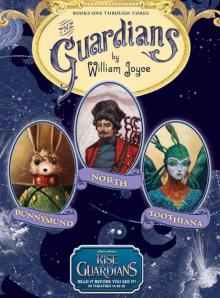 The Guardians: Nicholas St. North and the Battle of the Nightmare King
The Guardians: Nicholas St. North and the Battle of the Nightmare King The Lost
The Lost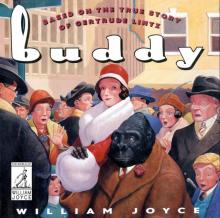 Buddy
Buddy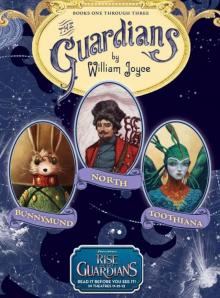 The Guardians
The Guardians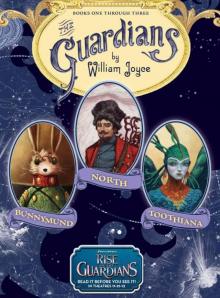 The Guardians: Nicholas St. North and the Battle of the Nightmare King; E. Aster Bunnymund and the Warrior Eggs at the Earth's Core!; Toothiana, Queen of the Tooth Fairy Armies
The Guardians: Nicholas St. North and the Battle of the Nightmare King; E. Aster Bunnymund and the Warrior Eggs at the Earth's Core!; Toothiana, Queen of the Tooth Fairy Armies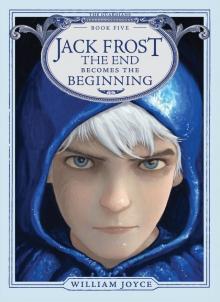 Guardians Chapter Book #5
Guardians Chapter Book #5